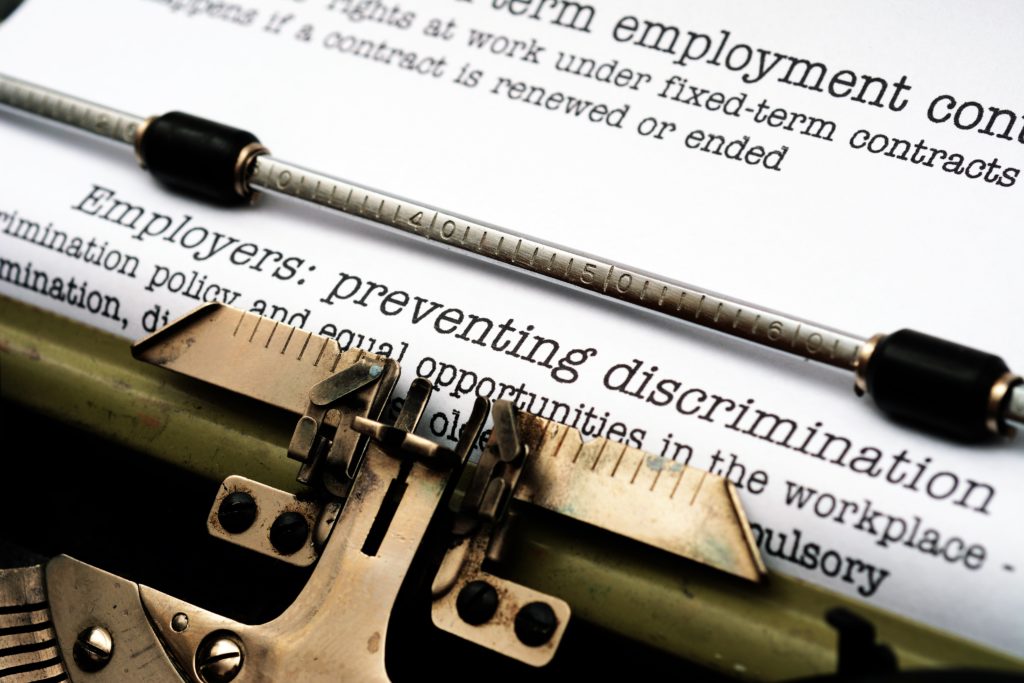 It’s an unfortunate fact that when it comes to motherhood and the workplace, the U.S. is far behind in comparison to other developed countries. From child care costs to maternal leave, mothers striving to have a career and a family are faced with all types of obstacles. The most shocking fact is that job discrimination aimed at mothers in the workplace can start long before Junior is actually here. Though pregnancy discrimination happens at an alarming rate from blue collar, to pink, to white, recent findings have shown that the most job discrimination complaints being filed through the Equal Employment Opportunity Commission (EEOC) are through low wage workers.
It’s an unfortunate fact that when it comes to motherhood and the workplace, the U.S. is far behind in comparison to other developed countries. From child care costs to maternal leave, mothers striving to have a career and a family are faced with all types of obstacles. The most shocking fact is that job discrimination aimed at mothers in the workplace can start long before Junior is actually here. Though pregnancy discrimination happens at an alarming rate from blue collar, to pink, to white, recent findings have shown that the most job discrimination complaints being filed through the Equal Employment Opportunity Commission (EEOC) are through low wage workers.
The Pregnancy Discrimination Act lays out specific instances of professional backlash that an employer cannot commit against a woman for reasons of pregnancy or pregnancy related medical conditions. For example, an employer may not sideline, withhold promotions, or force a pregnant woman on leave if she is capable of fulfilling her duties. In addition, withholding training or other opportunities for advancement can also be viewed as job discrimination if it can be proven that it was due to a pregnancy. Recently, a high powered executive reported her employers for sidelining her career due to her expressing she might get pregnant.
When it comes to employers rights, they do have the responsibility of providing equal benefits to all employees. So, if an employer allows another employee to work from home due to a disability or illness, they are responsible for providing those same accommodations for a pregnancy related issue. However, the Pregnancy Discrimination Act applies only to employers that have 15 employees or more. The other federal protection act that mentions pregnancy and other pregnancy related discrimination is the Family Medical Leave Act, or FMLA. Unfortunately, this particular act only applies to employers that have 50 or more employees.
Being a victim or a witness to job discrimination, no matter the reason, is never a pleasant experience. If you suspect that you are being discriminated against due to pregnancy, it’s time to talk to an employment lawyer. In order to file a job discrimination claim, you must first make sure that it is a case of discrimination. Part of this is knowing what kind of proof you need to have in order to be successful in your claim.
The Law Office of Perry Pinon, we can help you determine if you have a case for job discrimination due to pregnancy or anything else covered by the Civil Rights Act of 1964. No one deserves to be treated as less, especially in the workplace, due to pregnancy, race, sexual orientation, or anything else. It’s time to fight back- contact our lawyer today!
Common Forms of Job Discrimination and How to Handle It
No matter where you work or what kind of job you do, as an employee, you have rights. These rights protect you from all kinds of things, like wrongful termination and sexual harassment, and they can also protect you from wrongful job discrimination. If you’ve been discriminated at your job for reasons you believe are unjust, an employment lawyer can help you fight for your rights. Here are some of the most common forms of job discrimination the Law Office of Perry Pinon has seen.
Even though it’s the 21st century, it still happens. Many employers discriminate against women, especially pregnant women, because they “fear” that they won’t give it their all because they’ll be “too distracted.” We know this sounds harsh, but it’s unfortunately how many people think. This form of job discrimination is illegal, though. Plus, it’s a very backward way of thinking. Bottom line is, if you’ve been discriminated against because of a pregnancy, or even just because you’re female, an employment lawyer can help you.
For many reasons, some reputable and some based solely on stereotypes, age is a huge reason why many people discriminate against employees and potential job candidates. This is also illegal, though. There are exceptions, like if you’re applying to be a bartender but you’re still in high school or to be president of the United States but you’re not old enough (it’s in the constitution), but many employers take the liberty of discriminating anyway, even if the reasons don’t match with the exceptions. Job discrimination like this can be enough to make a case.
Employers are expected to respect an individual’s religious beliefs and customs. While it’s acceptable for an employee to not let someone do anything based on their religion that could harm the company and its employees, they need to respect the majority of religious customs. It’s illegal for them not to, especially when discriminating on the job and during an interview.
Oftentimes, this is where a lot of the employment discrimination takes place. Many employers think lowly of interns and fellows (even though this should definitely not be the case), so they discriminate against them in many ways. In these cases, we see a lot of age- and race-related discrimination. It’s also not uncommon for employers and companies to harass interns. Job discrimination and workplace harassment should both be taken seriously.
Job discrimination is no laughing matter, and we don’t treat it as such. At the Law Office of Perry Pinon, we can help you make a case if you’ve been discriminated against wrongfully. Call us today so we can better assist you.
Do Job Discrimination Laws Apply to Tattoos in the Workplace?
We have written a lot in the past about how Title VII of the federal Civil Rights Act of 1964 applies to a variety of common employment discrimination scenarios. In this blog post, we want to take time to consider how this act relates a less obvious breed of job discrimination that is emerging in the world today – tattoo discrimination.
Tattoos are more accepted than ever before, and statistics suggest that they will only continue to grow in popularity. Over 20 percent of U.S. adults are now inked, and 38 percent of the millennial population boasts at least one tattoo. And with millennials (people born from 1981-1995) integrating into the workforce in waves, the workplace/tattoo conversation is more loaded than ever before.
What do people think about tattoos in the workplace? Statistics suggest that there is still a large stigma around ink in the corporate world:
There has always been a type of stigma against tattoos in the workplace – that probably isn’t news to anyone. Questions are beginning to form, however, around whether or not this stigma will be allowed to continue. With tattoos becoming more popular, will workplace culture shift to make room for them? Will hiring managers and human resources be able to leave tattoos out of the overall evaluation process? And if not, should employment law be applied to protect against tattoo bias?
Because Title VII of the Civil Rights Act of 1964 protects employees and prospective employees from job discrimination on the basis of race, color, national origin, sex, and religion, there may be a way to apply it to protect people with tattoos. If an employer enforces policies against tattoos inconsistently, for example, the employee may be able to claim discrimination against race, gender, etc. If an employee has tattoos that include religious significance and are important to his or her faith practices, the conversation may shift to one of religious discrimination. As you likely recognize, there is no cut and dry law that protects individuals from tattoo bias, but tattoo bias that clearly morphs into job discrimination can be addressed in court.
The discussion about tattoos, discrimination, and the workplace is still remarkably complex, but an experienced employment attorney can help. If you have more questions about this topic or need help evaluating your current employment situation, don’t hesitate to call the Law Office of Perry Piñón today!
The Protected Classes in Job Discrimination Law
Job discrimination is wide-ranging and complex, and this becomes especially apparent when you begin to sort through the vast array of terms, statutes, and acts that constitute anti-discrimination laws. Anti-discrimination laws are heavily regulated to ensure that all people are treated equally. They do not apply in every case of boss-employee disagreement. Someone may think that they have a valid claim because their boss is treating them unfairly, but that is not necessarily true. The Law Office of Perry Piñón can help! To file a successful claim, a person’s discrimination must fall within one of these “protected class” categories.
A protected class is “a group of people with a common characteristic who are legally protected from discrimination on the basis of that characteristic”. The protected classes include:
Do you fall into one of these protected classes and believe you have experienced unlawful job discrimination? Then the next step toward a successful claim is consulting with an experienced attorney. Perry Piñón has an impressive resume of successful employment discrimination cases. In addition, he is passionate about offering legal support to his clients. With this in mind, contact The Law Office of Perry Piñón today.
Job Discrimination and the Pursuit of Happiness

“We hold these truths to be self-evident, that all men are created equal, that they are endowed by their Creator with certain inalienable Rights, that among these are Life, Liberty and the pursuit of Happiness.” This iconic quote is one of the most memorable statements in the Declaration of Independence. It is widely applied in civil rights endeavors. While this important belief is literally etched into our national identity, however, it is still not fully embraced in every facet of society. When job discrimination occurs, for example, employers are denying victims the inalienable right to “the pursuit of happiness.” In these instances, the Law Office of Perry Piñón can help.
It is important to note that the Declaration of Independence does not say we have the rights to “Life, Liberty, and happiness”. Rather, it lists our rights to “Life, Liberty, and the pursuit of happiness”. The authors understood that happiness is not an inalienable, human right. Emotional, relational, and financial success are not a guarantee in life. Still, we have the right to pursue happiness. We have equal access to this right of pursuit. This is true regardless of our race, gender, religion, etc.
The Civil Rights Act was enacted to reclaim the equal access that is afforded to United States citizens by the Declaration of Independence. Under the Civil Rights Act, discrimination in the workplace is prohibited. Employment discrimination can take on several forms, but it comes does to unacceptable prejudice. When individuals are treated unfairly in the workplace as a result of discrimination, they are denied equal access to the pursuit of personal achievement and financial success.
While the Civil Rights Act serves to protect against employment discrimination, it can be incredibly challenging to prove that discrimination occurred. Victims must demonstrate that the employer or business owner had discriminatory intent, and this will require evidence. Victims may also be able to verify their claim if there are other employees who have suffered or are currently suffering the same type of discrimination. An experienced employment attorney will work with you to compile evidence. From there, the attorney will draw a detailed picture of the injustice occurring in your work environment. Proving discrimination may be a challenge, but it is made easier with the help of law experts.
If a victim chooses to engage in an employment discrimination lawsuit, the claim will likely be investigated by the Equal Employment Opportunity Commission (EEOC). The EEOC is an agency of the federal government that oversees and investigates charges in workplaces of 15 employees or more. State agencies may also investigate if state legislations are involved. An employment discrimination attorney can be incredibly helpful when it comes to navigating the complexities of discrimination lawsuits.
Everyone has an unalienable right to the pursuit of happiness. Employment discrimination is an assault on this right. If you are a victim of job discrimination that is seeking recompense, contact the Law Office of Perry Piñón for support.
The Surprising Truth About Racism and Job Discrimination
The United States has come a long way since the Civil Rights Movement. That does not mean that racism has been completely eradicated from American soil. In fact, according to data produced in 2015 by Pew Research Center, half of Americans believe that racism is still a significant problem in the United States. This number is up 17 percent from a similar survey conducted only five years prior. Discrimination can appear in the workplace, for example. If you’re a victim of job discrimination, The Law Office of Perry Pinon can help.
The Civil Rights Act of 1964 was enacted to serve as a safeguard against racism and discrimination. Nonetheless, roughly six-in-ten Americans believe that the United States needs to continue to make adjustments and improvements in order to achieve racial equality. Racism is more obvious in some spheres of society than in others. One place it shows up frequently is in the context of the workplace.
Title VII of the Civil Rights Act of 1964 was written to address the work environment, specifically, defending people from job discrimination on the basis of race, color, national origin, sex, or religion. The Equal Employment Opportunity Commission (EEOC) serves to enforce civil rights against workplace discrimination.
While these legislations and organizations were meant to serve as safeguards against racial inequality, racism still seeps through the cracks and into the workplace from time to time. Here are a few surprising facts:
The statistics clearly indicate that the United States has a long way to go in the effort to overcome race-related job discrimination, but there are many people working to make things right. Perry Piñón is one such individual. His law practice holds a passion for employment law. He represents clients in all types of job discrimination cases. As long as workplace discrimination persists, the Law Office of Perry Piñón is ready to fight against it.
Standing Up Against Job Discrimination Due to Pregnancy
 Maternity leave and paternity leave (now called parental or family leave) have recently become newsworthy topics of discussion, and it is about time. Having a baby is a beautiful and inspiring thing, but it also comes with heavy demands on our time, our finances, and our emotions. Moreover, many people feel like pregnancy will ruin their hard working reputation at their workplace or negate their chances of progression in their career. This mentality is reinforced by inadequate parental leave policies, intense pressure from bosses or coworkers to get back to the office, and (in extreme cases) pregnancy and job discrimination. If you’re a victim, the Law Office of Perry Pinon can help.
Maternity leave and paternity leave (now called parental or family leave) have recently become newsworthy topics of discussion, and it is about time. Having a baby is a beautiful and inspiring thing, but it also comes with heavy demands on our time, our finances, and our emotions. Moreover, many people feel like pregnancy will ruin their hard working reputation at their workplace or negate their chances of progression in their career. This mentality is reinforced by inadequate parental leave policies, intense pressure from bosses or coworkers to get back to the office, and (in extreme cases) pregnancy and job discrimination. If you’re a victim, the Law Office of Perry Pinon can help.
Pregnancy discrimination is a form of job discrimination that stems from underlying biases in the workplace. Some examples of this form of discrimination include demoting or terminating a pregnant employee, not hiring someone only because she is pregnant, refusing to treat a pregnant employee with the same care as other temporarily disabled employees, and denying work to someone when he or she returns from parental-leave.
The list is far more comprehensive, of course, and pregnancy discrimination can come in many forms. Title VII of the Civil Rights Act of 1964 makes this form of discrimination illegal, and the Equal Employment Opportunity Commission continues to enforce and reevaluate pregnancy discrimination policies. This means that there are several potential cases of job discrimination related to pregnancy that are not specifically identified by the law. If a pregnant employee needs to visit a doctor, for example, and she is penalized for missing work, this could be a form of pregnancy discrimination.
If you suspect that you are experiencing discrimination due to pregnancy, there are a few things you can do. Make sure to get every request for pregnancy accommodation in writing so that you have evidence of your efforts. You should also make sure to know your rights as a pregnant employee. You can refer to the the Pregnancy Discrimination Act of 1978 and the the Family and Medical Leave Act of 1993 (FMLA) if you wish to learn more about the extensions of the Civil Rights Act in regard to pregnancy.
If you feel helpless to stand up against this discrimination or are simply unsure where to begin in your exploration of the law, you can consult with a law office such as Perry Piñón. Pregnancy is a beautiful gift, and it should never stand in the way of fair employment. Lawyers understand how serious job discrimination is, and they will fight to eliminate it in all forms.
Job Discrimination — Common Ways it Manifests
 It’s the sad truth that job discrimination is common. Thankfully, there are strong federal laws that prohibit any kind of bias toward individuals at the job. Discrimination based on race, sex, and age are the most common cases. When an issue arises in your job, it’s important to know you’re not alone. Since this can manifest in a variety of ways, victims must be aware of the available legal options. The Law Office of Perry Piñón offers legal assistance to victims of job discrimination in El Paso.
It’s the sad truth that job discrimination is common. Thankfully, there are strong federal laws that prohibit any kind of bias toward individuals at the job. Discrimination based on race, sex, and age are the most common cases. When an issue arises in your job, it’s important to know you’re not alone. Since this can manifest in a variety of ways, victims must be aware of the available legal options. The Law Office of Perry Piñón offers legal assistance to victims of job discrimination in El Paso.
One of the most common forms of job discrimination is of the racial variety. An employer cannot hire someone based solely on their race. Upon hiring an employee, the employer is not able to give preferred treatment to employees based on their race. Giving employees raises, benefits or more responsibility based on their race is discriminatory treatment. To put it bluntly, it is discrimination if an employer hires white or lighter-skinned individuals instead of non-white applicants.
Sex discrimination is also common in the job. This type of discrimination can manifest in wages, treatment and sexual harassment. It is illegal to pay women less than their male counterparts when both are working similar jobs. Treating women differently because of pregnancy or even marital status can constitute as sexual discrimination. In addition, any sexually inappropriate language and behavior is prohibited.
Age discrimination focuses on treating individuals over 40 years of age in a negative and different manner. It is illegal and unlawful to discriminate against people over 40 in instances of hiring and firing, as well as in wages and job assignments. It is discriminatory to give any preferred treatment to younger employees over older employees.
Job discrimination isn’t something you should suffer through. Victims of discrimination should not feel like their backs are against a wall. At the Law Office of Perry Piñón, we have the experience and knowledge necessary to help victims of job discrimination. By teaming up with an experienced lawyer, you can fight against any workplace discrimination. The workplace should be a safe space where you can thrive and grow as an individual while making a living. So, if this isn’t the case in your office, you need a strong legal team at your side. With our help, you can get out of this negative situation. Contact the Law Office of Perry Piñón today!